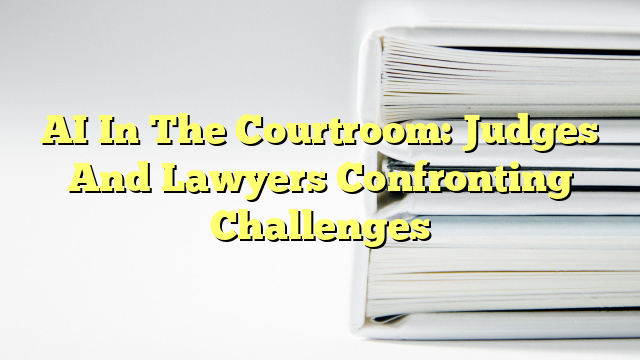Table of Contents
- How will lawyers be affected by AI?
- Can artificial intelligence be used in courts?
- Can AI replace a judge in the courtroom?
- How can AI help judges?
Advances in artificial intelligence (AI) technology have already made significant impacts on various industries, and the legal field is no exception. AI has the potential to transform the way court cases are handled, from the way evidence is collected and analyzed to the way judges make decisions. This article will discuss the implications of AI in the courtroom, and the challenges that both judges and lawyers will face as technology continues to evolve.
How will lawyers be affected by AI?
Lawyers will be greatly impacted by the introduction of AI in the courtroom. AI can reduce the amount of time spent by lawyers researching and analyzing cases, as AI technology can quickly and accurately search through volumes of evidence for relevant information. Furthermore, AI could be used to find arguments or evidence that a lawyer might have overlooked, which could improve the lawyer’s chances of winning a case. Additionally, AI could be used to generate legal documents such as contracts and pleadings, which would make the job of lawyers more efficient.
On the other hand, AI could also reduce the need for lawyers in certain cases. For example, AI could be used to provide an automated legal opinion or to assist with negotiation of settlements. As such, AI could take away business from lawyers, as fewer lawyers may be hired to handle such cases. Finally, AI could also affect the way lawyers interact with clients, as AI may be used to provide more accurate predictions and advice.
Can artificial intelligence be used in courts?
Yes, AI can be used in courts. AI can be used in various capacities, from collecting evidence to analyzing data. AI can also be used to help judges make decisions. For example, AI can be used to help judges identify relevant facts and analyze evidence more efficiently.
AI can also be used to generate legal documents and pleadings, which can make the job of lawyers more efficient. Furthermore, AI can be used to help lawyers research and analyze cases more quickly. Finally, AI can be used to provide automated legal opinions, which could reduce the need for lawyers in certain cases.
Can AI replace a judge in the courtroom?
No, AI cannot replace a judge in the courtroom. While AI can be used to help judges make decisions, the ultimate decision must be made by a human judge or jury. AI systems are not capable of making the same judgments or having the same level of empathy as a human judge, as AI systems are not programmed to consider things such as emotion or human understanding.
Furthermore, AI systems rely on data to make decisions, and data can be biased. As such, there is a risk of bias in the decision-making process. Additionally, AI systems are not capable of considering things such as morals or ethics, which may be relevant to some cases. AI can be used to help make decisions more efficiently and accurately, but ultimately a human must make the final decision.
How can AI help judges?
AI can help judges in a variety of ways. AI can be used to collect and analyze evidence more quickly and accurately. Furthermore, AI can be used to generate legal documents and pleadings, which can make the job of lawyers more efficient. Additionally, AI can be used to provide automated legal opinions, which could reduce the need for lawyers in certain cases. Finally, AI can be used to identify relevant facts and analyze evidence more efficiently, which can help judges make more informed decisions.
AI technology is still in its early stages, and more research is needed to understand the full implications of AI in the courtroom. Nevertheless, AI has the potential to revolutionize the way court cases are handled, and both judges and lawyers will need to be prepared to confront the challenges that AI will bring.

